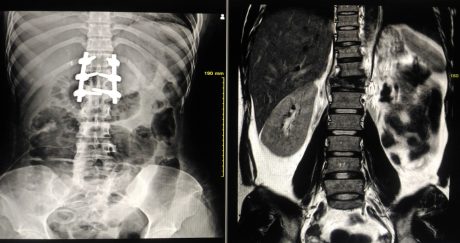PB was an active 49-year-old working as a manual labourer when he sustained a spinal infection in 2016. This developed into discitis and an abscess, causing spinal cord compression and permanent injury to his thoracic spine. PB had sought medical advice on four occasions before receiving the correct diagnosis. He instructed Stewarts to investigate whether he should have been treated earlier and if he could have avoided his spinal cord injury.
Senior associate Katherine Fitter and paralegal Alina Antony review PB’s case here.
Background
In the early summer of 2016, PB began to experience severe back pain between his shoulder blades. He attended his GP surgery on three occasions in a month, complaining of progressively worse pain. PB had a history of Hepatitis C and previous intravenous drug use. He felt his past drug use was a factor in how he was treated and that his complaints were not taken seriously because of this. He also attended an Urgent Care Centre seeking out-of-hours treatment but was sent back to see his GP again.
PB’s condition deteriorated to the point that he had to move in with his mother for support. Eventually, he collapsed at his mother’s home and was admitted to hospital via ambulance. Initially, an abdominal infection was suspected, but a CT scan revealed signs of a spinal infection, and PB underwent an MRI scan the next day to confirm this. He was then prescribed IV antibiotics to treat the infection. Shortly after this, it was found that PB was developing weakness in his legs as a consequence of spinal cord compression and was transferred for urgent spinal surgery at another hospital. The operation decompressed his spinal cord, removed the infection that had formed an abscess and added instrumentation to stabilise his spine.
Following surgery, PB was on bed rest for six weeks and on antibiotics for three months. He had to undergo another surgery two months later to stabilise screws that had been displaced from the first operation.
PB underwent rehabilitation at a specialist spinal unit for several months but was left with a permanent T11 ASIA D spinal cord injury. He is reliant on walking sticks or a wheelchair for mobility due to impaired sensation and strength in his legs, pelvis and lower trunk. He suffers from neuropathic pain in his lower rib cage and legs in addition to symptoms of bladder, bowel and sexual dysfunction.
The legal case
The claim was initially investigated by Aimée Morris, with Katherine Fitter taking over conduct after court proceedings had been issued. Expert evidence was obtained, which advised that the GPs and nurse who saw PB should have considered spinal infection as a diagnosis. Neurosurgery and microbiology experts then advised that PB would likely have had a better outcome with earlier diagnosis and treatment.
Liability was denied by the defendants on the basis that diagnosis should not and could not have been made earlier. They said that even if it had been, the infection would already have caused some damage.
The case almost proceeded to a trial on liability, but PB elected to accept a compromise settlement at 50% of damages. This reflected the ongoing areas of dispute between the experts after expert joint discussions to try and narrow the issues had taken place.
Following the liability settlement, the defendant released a significant interim damages payment to PB. This allowed PB to instruct a case manager, who helped him access much-needed therapies and equipment. He was also able to employ a support worker instead of relying on family members for assistance as he had been.
Final settlement
After both parties had obtained expert evidence advising on PB’s lifelong needs, his claim was settled for a lump sum of £1.4m (inclusive of the 50% discount). PB is looking forward to purchasing more suitable accommodation for the long term and moving forward with his life with a greater level of independence.
PB says: “Stewarts have worked on my behalf for a very long time ensuring that I finally got the award I deserved. Without their perseverance and advice all the way through this lengthy process it’s possible I might have given up! I am so grateful for their hard work as the final result has meant the quality of my life has improved beyond all measure.”
You can find further information regarding our expertise, experience and team on our Clinical Negligence page.
If you require assistance from our team, please contact us.
Subscribe – In order to receive our news straight to your inbox, subscribe here. Our newsletters are sent no more than once a month.





